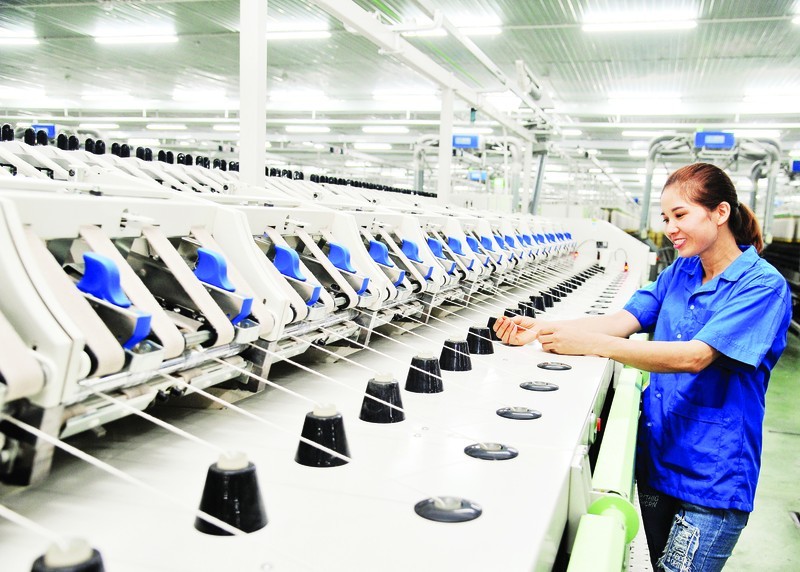A year of resilience
2023 is said to be a year of successive misfortunes for both the world and the Vietnamese economy, with more risks and challenges than opportunities. Inflation has decreased but remains high, in addition to high-interest rates, persistent and complicated geopolitical tensions, growing financial and monetary risks, and unstable energy and food security, which have slowed down trade, consumption, investment and global economic growth. Despite many difficulties, the Vietnamese economy in 2023 achieved many positive and remarkable results and was highly appreciated by international organisations.
Specifically, Vietnam’s GDP in 2023 expanded by 5.05% compared to the previous year. This is a remarkable result for an economy with great openness like Vietnam. Agricultural, forestry and fishery production in 2023 continued to be a strong pillar of the economy. Industrial production experienced a challenging year but followed a positive trend, especially in the last months of the year. At the same time, the positive recovery of trade, consumption and tourism activities compensated for economic growth. The service sector made the largest contribution to the economy, at more than 62% of the added value of the entire economy.
World Bank Lead Economist for Vietnam Andrea Coppola described Vietnam’s economy in 2023 as “resilient”. He said that amid the global economic slowdown, Vietnam was still able to sustain a rate of growth that many other countries in the rest of the world can only dream about. The resilient recovery of Vietnam’s economy is driven by three main factors: a gradual recovery of external demand for Vietnamese exports, increasing public investment, and resilient private consumption.
According to economic expert Dr Nguyen Bich Lam, former Director General of the General Statistics Office, public investment emerged as an important driving force in 2023, playing the role of promoting and compensating for other growth drivers. It also helped improve the capacity and competitiveness of the economy, creating a foundation to boost rapid growth. In addition, Vietnam’s economic picture in 2023 also recognised the important contribution of the business sector. The business community was always proactive, flexible, and creative in overcoming challenges, gradually fostering economic development.
 |
| Economy in 2024: Efforts to overcome difficulties |
However, the economy still revealed limitations, such as the decline in production of some key industries, mainly due to a lack of production orders. The added value of the industrial sector in 2023 increased by only 3.02% compared to the previous year, the lowest increase in the 2011-2023 period. Import and export turnover decreased by 6.6% over the same period last year. The export turnover fell by 4.4% in the context that monetary policies of countries around the world continued to tighten, and world aggregate demand decreased, leading to a decline in export orders. In addition, newly established businesses still face many barriers to accessing capital. The total registered capital of newly established enterprises reached 1.52 trillion VND, down 4.4% compared to the previous year. The average registered capital of a newly established enterprise was only 9.6 billion VND, down 10.8% compared to 2022.
Promoting growth drivers
2024 is an important pivotal year for Vietnam’s economy, creating conditions for completing the goals for the socio-economic development in the 2021-2025 period. Therefore, to complete the growth target of 6-6.5% as set by the National Assembly requires the participation of all sectors right from the beginning of the year.
In 2024, Vietnam’s economy is still expected to face many challenges, such as the unclear recovery ability of the global economy, which is likely to continue to impact Vietnam’s economy. Domestically, opportunities and difficulties are still intertwined, while traditional motivations are still weak and new motivations are still dim.
Expert Andrea Coppola said the international context is expected to remain challenging. After the global recession in 2023, global economic growth is expected to decelerate further in 2024, including Vietnam's important trading partners, such as the US. In addition, the recent increase in trade protectionism has had a significant impact on Vietnam's international integration and trade.
According to Dr Can Van Luc, the world will face many difficulties in 2024, as geopolitical risks are still very complicated and wars are persistent. Especially recent conflicts in the Red Sea will hinder traffic and transportation of goods and services, causing an increase in logistics costs. Issues related to food and energy security are risks which still require attention.
Especially with the global financial and monetary market, the bank failures in the past year have made the banking system more cautious, and there will be stricter regulations and supervision, causing global credit growth to a lesser extent. World investment has also recovered but at a slow pace. Consumption, especially in two major markets of the US and China, has been still quite cautious.
In the context of many unpredictable developments in the world economy, the WB expert recommends that Vietnam needs to improve its resilience to external shocks and take advantage of internal strength and domestic productivity to support economic growth. In this way, Vietnam can turn the challenges created by the global economic recession into opportunities to further strengthen the country's economic growth model. Vietnam can support economic growth through fiscal policy by accelerating the implementation of infrastructure projects and transformational public investment projects to boost economic growth in the short and long term.
According to Dr Nguyen Bich Lam, in 2024, economic growth will still mainly rely on four issues, including innovation to ensure institutional uniformity and a legal environment for economic development; the promotion of consumption of the domestic market with a scale of 100 million people and tens of millions of international tourists; the quick and effective implementation of public investment capital towards creating spillovers to non-state investment to improve the capacity and competitiveness of the economy; and the strengthening of exports of goods and services.
Can Van Luc also said that to achieve the set goals, in terms of monetary policy, it is still necessary to continue to maintain the same policies as in the past, loosen them carefully and flexibly to ensure the growth goal and policy coordination to better control interconnected risks among banking, securities, insurance, and real estate. In addition, it is crucial to take more drastic actions related to economic restructuring, especially weak businesses and credit institutions, to ensure more effective mobilisation and allocation of resources.
Despite many challenges, experts also agree that Vietnam's economy will continue its growth recovery trend. The WB forecasts that Vietnam's economy will grow by 5.5% in 2024 and 6% in 2025. Credit rating agency Fitch Ratings recently made an optimistic forecast for Vietnam's economic growth in 2024 and 2025. Specifically, Fitch Ratings believes that Vietnam's domestic financial and monetary policies have greatly supported the economy. Accordingly, Fitch forecasts that Vietnam's economic growth will reach 6. 3% in 2024 and 7.0% in 2025.
According to the forecasts by Dr Can Van Luc, it is estimated that Vietnam's economy can reach a growth rate of about 6-6.5% by 2024. The recovery of the sectors is quite even, including agriculture, industry, construction and the service sector. Regarding inflation, with the money supply and other influencing factors, inflation is completely under control at about 3.5-4%. In addition, the exports are also expected to recover in 2024, possibly growing positively again at 5%.
To successfully and comprehensively implement the 2024 socio-economic development plan, especially the target of gross domestic product growth, towards creating favourable momentum to achieve the highest goals under the socio-economic development plan for the 2021-2025 period and creating position and strength for the country to develop rapidly and sustainably in the next period, the Government and localities need to make efforts to resolve bottlenecks and remove difficulties for production and business, as well as boosting growth drivers. In particular, the Government promptly updates and adjusts solutions in line with the changes in the world economy to support businesses in overcoming difficulties, stabilising and developing production./.






















































